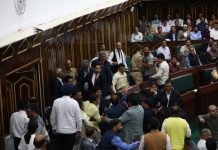[cycloneslider id=”revolution-3″]
The 6 am start is annoying, but necessary. If Punyabrata Goon is to get through the almost 200 patients who will come to the Shramik Krishak Maitri Swasthya Kendra (Worker-Peasant Friendship Hospital) before noon, a morning lie-in is out of the question. Already, his team of health workers, girls from the vicinity of the village of Chengail, where the hospital is located, have opened the doors and begun the process of registering the swelling crowd of patients. The sight of his car causes a flurry of activity. The doctor is in.
Stepping on the bridge of protruding flagstones over a puddle caused by the previous night’s rain, Goon points out to me a building in the distance: the Kanoria Jute Mills, whose trade union had started the hospital in 1995, taking inspiration from the Shaheed Hospital in Dalli-Rajhara, Chhattisgarh, where he had worked for close to a decade. The hospital, part of Goon’s Shramajibi Swasthya Udyog (Working Class Health Project), isn’t the only option for the villagers. There are a number of hospitals, clinics and nursing homes on the side of the highway; Kolkata is only 25 km away; and the district town of Uluberia has a large government hospital. However, it is a truth acknowledged by most doctors that the healthcare system in West Bengal, as elsewhere in the country, is exploitative of the poor and poorly managed. In a country where up to 80 percent of healthcare costs are borne by the patient, and where the World Bank estimates that 35 percent of hospitalised people fall below the poverty line as a direct result of their hospital expenses, Goon provides what he calls humanist care: healthcare at prices the poor can afford. The total cost of a visit to the doctor rarely crosses 100. But the hospital isn’t a charitable organisation; barring some equipment donated by well-wishers, it accepts no outside funding, instead using rational practices and common sense to keep costs low.
‘Rationality’ is a favourite word. Goon’s practice of taking detailed case histories is one such manifestation. His health workers — assistants he has trained himself — meet every patient and, through a comprehensive form, ask them questions about their physical and mental health, the languages they speak, their history of treatment and their socioeconomic conditions. This helps the doctors diagnose illnesses without having to resort to expensive (often unnecessary) tests. “Imagine you visit a doctor on a complaint of fever,” he wrote in an article about his initiative. “The doctor gives you a list of tests without enquiring about the history. The list includes blood and urine tests, test for malaria parasite in the blood, widal test for typhoid, culture sensitivity test of urine. In case of a big doctor there will be further tests of blood culture, malaria antigen, blood test for dengue, and so on. These tests are not always recommended in the interest of the patient. Many of us know that the doctors receive commission for recommending those tests.”
Goon meets his patients with a ready smile, without the brusque officiousness they are used to. He makes idle chatter while examining them; he asks one young man how married life is treating him, another whether working conditions in his factory have improved since a recent strike. He is irritated when a woman says she cannot leave her shop to come for her weekly injection. “Once you get sick, how will you work at your shop?” One patient has come from Bongaon, almost 100 km away, because of Goon’s reputation as a skilled doctor who cares for the poor.













